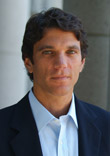HRTS eNews - 06/30/2010 (Plain Text Version)
In this issue:
HRTS News
•
Conan, Advertising Dollars, and Broadcast vs Cable: This Year's State of the Industry
•
LATV Fest
•
Winner of the My Friend's Place raffle
Member Profiles
•
Joe Earley
•
Stephan Shelanski
Broadcasting & Cable Event
•
Anne Sweeney to Keynote B&Cís Womenís Event July 15 in LA
HRTS Online
•
Miss the State of the Industry luncheon?
Member News
•
Welcome New Members
JHRTS
•
JHRTS News & Announcements
About HRTS
•
Officers, Board of Directors, Staff
Stephan Shelanski
HRTS Member - Executive Vice President of Programming at Starz Entertainment
 A Member Profile by Chris Davison, chris@lthmedia.com
A Member Profile by Chris Davison, chris@lthmedia.com
Stephan Shelanski is Executive Vice President of Programming at Starz Entertainment. I recently had a chance to interview Stephan to discuss programming, branding and Netflix.
Q: Can you tell us about your background and what made you want to work in entertainment?
-I was a math major in college, but I always loved film and television. Luckily for me, a classmate of mine was working at HBO and told me of an open position in the research department. I thought this would be a unique way to combine my math background with my interest in film and TV, and I was fortunate enough to get the position. To learn more about the film and television industry I went to NYU Film School and received a Masters Degree in Cinema Studies. Then in 1994 I made the move to Starz (the company was named Encore at the time) and have been here ever since. So I've worked in premium TV my entire career and for just for two companies, HBO and Starz.
Q: What is the Starz brand and how is it different from other premium channels?
-the Starz brand is evolving as we step up our presence of Originals. Where we used to be strictly movies, we now have successful series to program and promote in addition to our movie strength. And in the next two to three years, our investment into Originals will be expanding greatly. Ultimately, our goal is for our brand to be more accessible, more adventurous and fun than perhaps what the other premium networks have established.
Q: When developing new shows at what point do you feel that you may have a hit?
-after all the episodes have played and you have all the ratings and reviews, then you may have an idea whether the show was a hit or not. Seriously, it's very hard to predict. When you are in the development stage you think that every show can be a hit, otherwise you shouldn't be wasting your time developing it. I guess the exception for us was when we were developing Spartacus. We knew the show would be exciting just based on the action and the graphic effects, but when we started getting the outlines and the first scripts, we realized how wonderfully crafted the stories were, how troubled and interesting our characters were. Then we knew we really had something special - a show that had action and great visual effects, and had a compelling storyline with rich characters.
Q: How does your quantitative background inform your programming decisions?
-I think it gives me a very pragmatic point of view when assessing programming decisions. And that is often a good contrast to how people in the industry may tend to think, or make decisions. I think it helps create a good balance in how we look at our line-up and determine which shows we produce or what movies we acquire.
Q: How do you interact with your viewers in the new media space?
-we are very aggressive in the new media space. For our Originals, we allow the first episode or two to be streamed for free on our website, on our affiliates’ websites, and on DirecTV's channel 101. These sample episodes can be seen by anyone, whether or not you are a Starz subscriber. The goal is to generate interest in the shows, and encourage potential subscribers to sign up for Starz if they want to see the entire season. We also have a unique distribution deal with Netflix where you can view all of Starz's content on their Watch Now platform.
Q: How do you see the industry changing over the next few years?
-the good news is that people are watching more TV than ever. The new media space hasn't yet made a significant impact on traditional TV, and probably won't for several more years. In time I think the internet will need to adopt a similar structure that the cable/satellite industry has established. There needs to be a way for the distributor and the content owners to monetize their product in the new media space - right now the consumer gets it all for free and the ad revenue is very small. So there will need to be a charge for the content, and that could come in the form of a charge for the individual program, a subscription to an individual service, or a payment to a content aggregator that delivers all the content through their platform, or any combination of these methods. I think that will be the biggest change, how the new media space will need to adapt to the marketplace and how it will start to look more and more like traditional TV affiliates.